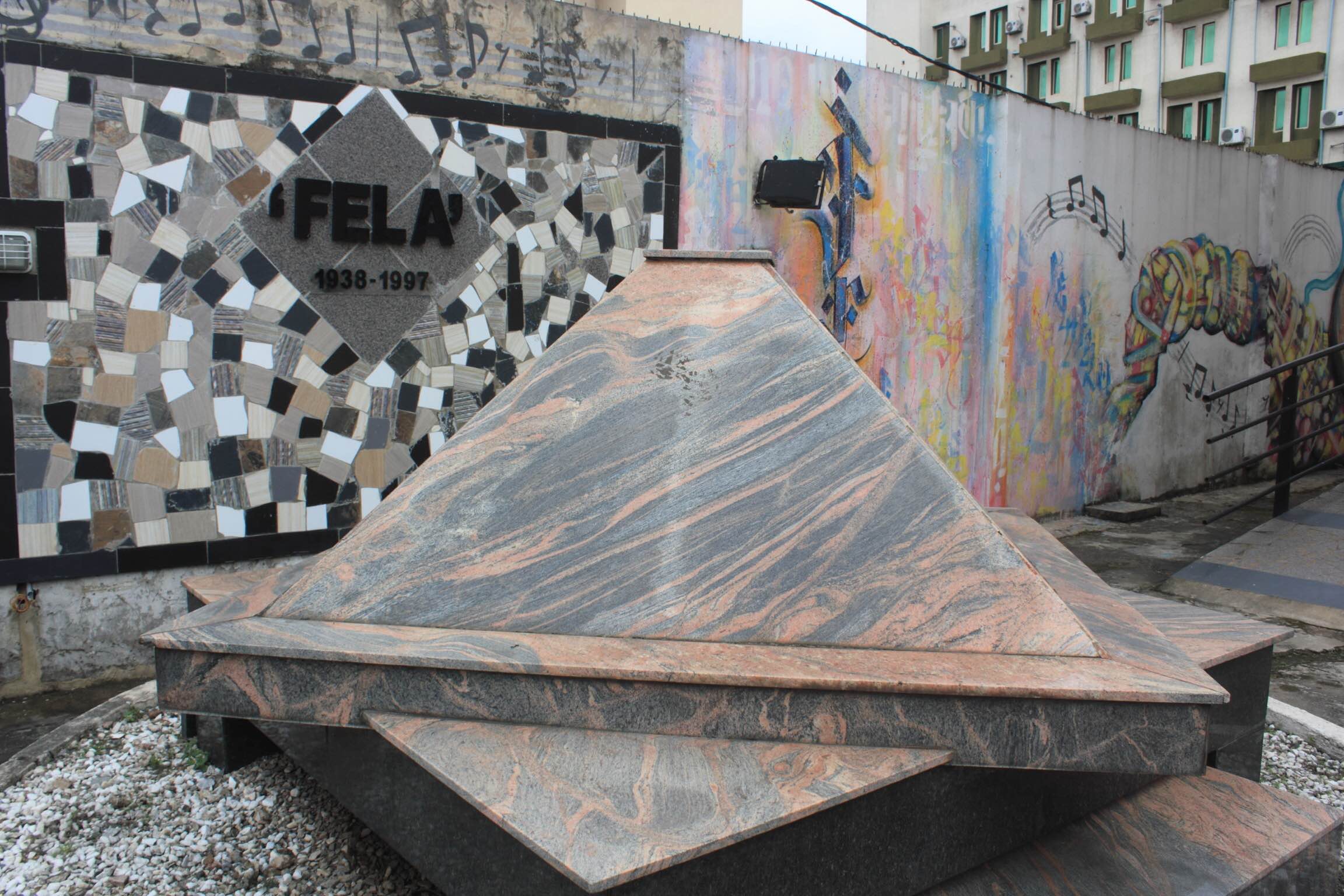On a quiet, otherwise nondescript street in Lagos stands the Kalakuta museum. The striking white, three-storey building opened in 2012 to honour Nigeria’s most influential and outspoken musician and activist: Fela Anikulapo Kuti.
The museum houses numerous artifacts, photographs and mementos from Fela’s life including his saxophones, an impressive shoe collection and even his bedroom, left unchanged since the day he died. Outside in the courtyard of the museum is Fela himself, buried beneath a sizeable marble pyramid.
It’s not unusual to see the odd bottle of gin in front of his shrine as a tribute from fans, particularly during Felabration, an annual week-long festival organised by the Kuti family every October (the month he was born) to celebrate his life.
To begin to understand Fela and his immense popularity you have to understand something about Nigeria.
Described as a mix between Che Guevera and Bob Marley, Fela was for many Nigerians more than just a musician or an activist. He was a fearless teller of truths, a musical revolutionary. A man who not only changed the face of Nigerian music but whose scathing criticisms of the polity shook the establishment to the core.
To begin to understand Fela and his immense popularity, you have to understand something about Nigeria. The status quo of the 170 million-strong nation is to ‘suffer and smile.’ It is more or less a national characteristic.
No matter the depth of corruption, the degree of governmental ineffectiveness, the strife, the poverty and the misery they encounter, Nigerians grin and bear it. Kicking up a fuss won’t change anything. Fela was also active during the era of military rule, where speaking out against the government could land you in jail – or worse.
.@2FaceIdibia on what #FelaKuti means to him
Listen to our #Felabration report today at 1900 GMT on Focus on Africa pic.twitter.com/qbNoUvkXPb
— BBC News Africa (@BBCAfrica) October 18, 2015
But Fela was someone who wouldn’t keep quiet. His music was laced with socio-political commentary, searing assessments of the country and attacks on political figures, religion and colonialism. Nothing was off-limits. In 1977, Fela released Zombie a scathing attack on the military. The government responded violently and stormed the Kalakuta Republic, beating Fela badly and throwing his elderly mother out of a window (she later died from her injuries). Fela’s response? He sent his mother’s coffin to Dodan Barracks where General Olusegun Obasanjo lived.
‘As far as Africa is concerned music cannot be for enjoyment. Music has to be for revolution. Music is the weapon.’
Perhaps it wasn’t so much that Fela wouldn’t keep quiet, but that he couldn’t. For him, music was as much about the message as it was anything else, maybe even more so. ‘As far as Africa is concerned music cannot be for enjoyment,’ he said in the 1979 documentary Music Is The Weapon. ‘Music has to be for revolution. Music is the weapon.’
And for him it was.
In Nigeria today military rule is long gone but things in many ways have remained the same way Fela described it. Poverty is still rife as is corruption and governmental mismanagement. Nigerians are killed daily, yet continue to suffer and smile. What has changed though is Afrobeat; the jazz, funk and Highlife-inspired genre Fela created couldn’t be further away from its origins.
Politics was at the heart of Fela’s Afrobeat but today most Afrobeat songs swing between three main topics: sex, money and partying. Or a mind-numbing combination of all three. Many Nigerian artists cite Fela as a huge musical influence… but you have to wonder how.
Where are the popular songs about the kidnap of the Chibok girls? Or the alleged missing 20 billion naira from the nation’s coffers?
Everywhere you look in Lagos, there’s a billboard of a musician asking you to choose a phone network or to buy a particular brand of powdered milk or chicken stock. Where are the popular songs about the kidnap of the Chibok girls? Or the alleged missing 20 billion naira from the nation’s coffers?
According to social media, some of these musicians have an idea (and in some cases a strong opinion) of what’s going on in the country. So why such silence where it counts among the country’s most popular artists?
It could be a number of things. Life in Nigeria is difficult enough. Who wants to hear a bunch of songs belabouring the point? It’s not like anything will result in any change, so why not just let music be about escapism?
The thing is if we’re all busy escaping all the time, what about reality?
Being apolitical and controversy-free means flowing endorsements and invites to sing at well-paid campaign rallies.
There’s the argument that the old type of Afrobeat wouldn’t be popular; it wouldn’t sell. But then there’s Fela. Whose music still plays on the radio. Who still gets people out of their seats. Who, every year, even 18 years after his death, has people coming in their droves to the New Afrika Shrine for Felabration. Who is still revered.
The easiest and most obvious answer is money. Being apolitical and controversy-free means flowing endorsements and invites to sing at well-paid campaign rallies. Why swap that for limited radio play and reduced income?
Because Nigeria is still a country fighting a war on many fronts and music could be a weapon. The question remains: are there any popular artists with the guts to use it?


